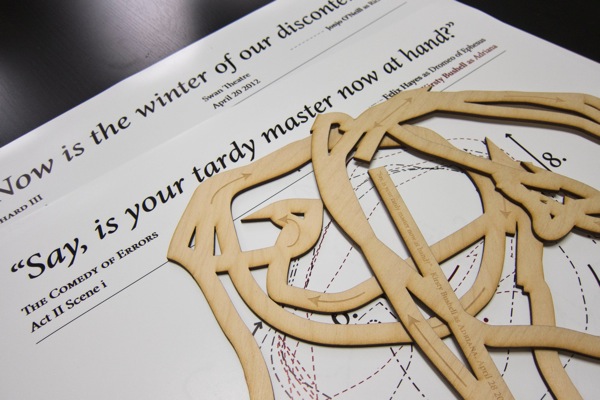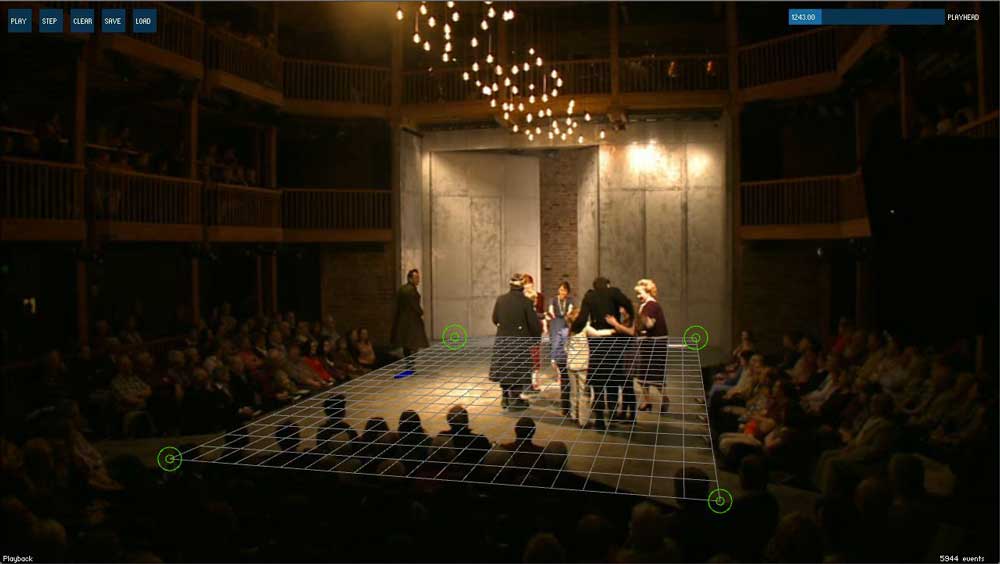-
"Rickshaw is a JavaScript toolkit for creating interactive time series graphs." This looks nice.
Week 6
23 November 2012
Week 6 began with a couple of days helping Alex with a workshop.
I also a spent a day with the fine folk of Pan exploring some pitch work – and it was lovely to just be in a space, working through ideas with them; they’re all good folk.
Squeezed into Wendesday was a day of writing: working up a draft for the Four Thought talk in just under two weeks.
Thursday saw the launch of Spirits Melted Into Air, a piece of work for the RSC that I’ve mentioned in passing (but not detail) in weeknotes a few times. It’s now live and in the world, and I’m really pleased with how it’s turned out; it’s nice to finally be able to show people a piece of work.
And now it’s Friday. I’m writing this from the back of economy on the way to the US, for a last-minute, spur-of-the-moment holiday – I’ll be in New York for the next week, taking some time to take stock, settle my head, and see the sights (and friends). Do say hello if you’d like to. I’m also going to take the time to perhaps write a little, and think about trajectories. But mainly, I’m going to eat, read, and have a bit of a holiday and an adventure.
New Work: Spirits Melted Into Air
22 November 2012
I’m excited to be able to share Spirits Melted Into Air with you: a two-week exploration I produced with the Royal Shakespeare Company, as part of their myShakespeare project.
The work is in parts a technology prototype, data visualisation, and artwork. Custom-built, open-source software is used to analyse performance video and generate plots of actors’ positions on stage from a perspective viewpoint. These plots are then used to generate new, secondary artworks: posters, and laser-cut wooden shapes.

The project emerged from an initial workshop and commission by Caper, where we explored various potential ways for technologists to collaborate with the RSC on short projects. From there, I dealt with the RSC direct, meeting key members of their team and understanding a bit more about the various factors influencing performances and productions there.
It was great to be able to take such a fluid, interpretative approach to the work. With hindsight, this was unsurprising: the RSC’s business is interpretation – taking Shakespeare and producing entirely new productions each year, of plays they have often performed countless times. My work was similarly interpretative: initially, building software to explore the data, and then exploring that data as a material – before moving onto the further material exploration of output formats. It’s the sort of structure to work that I’m fond of.

It was also great to have a brief to shape, and ultimately push myself: not just exploring a single technical idea, but seeing it through, end-to-end, to output and display. It was important to me that whatever came out of it – however prototype-y – was both beautiful and accessible. I think the output – especially the lasercuts – has stood up to that internal demand.
Thanks to Rachel and Kat at Caper for setting up the initial commission and the workshops; to Sarah and Ida, for producing the work from the RSC so superbly; and to everyone I met at the RSC who offered insight, ideas, and knowledge.
You can find out more at the Spirits Melted Into Air website.
And, if you’d like to know more about it, or indeed, to work with me on similar work – be it investigative, creative, or artistic – do get in touch.
-
via @aanand, and because I forgot to bookmark this when I read it the first time. Good, straightforward points.
-
"I wanted to compile a list of online, Web-based tools that Web engineers can use for their work in development, testing, debugging and documentation." It is a really good list (I say this mainly because the first thing on the list is RequestBin, which is the thing I always forget the name of).
-
"A little paper tiger stood on the table, the size of two fists placed together. The skin of the tiger was the pattern on the wrapping paper, white background with red candy canes and green Christmas trees.
I reached out to Mom's creation. Its tail twitched, and it pounced playfully at my finger. "Rawrr-sa," it growled, the sound somewhere between a cat and rustling newspapers."
Ken Liu's "The Paper Menagerie" is just a lovely short story. Sad, deft, minimal, very much worth your time. Might have had a little sniffle.
Week 5
18 November 2012
A few different directions to focus on this week. Monday and Tuesday saw me wrapping up a piece of work with Storythings, having finished up a few nice pieces of code – though the documentation that accompanied it turned out to be as important for demonstrating the work to the client.
The rest of the week focused on business development and quite a lot of admin – quite quiet, as a result, but some interesting meetings to potentially build on, perhaps in some new directions.
The RSC work will launch next week – quite excited to finally take the wraps off it. It was great to see Natalia’s piece in the same series of commissions go live.
Also, the announcement of my Four Thought talk on Thursday – which means next week will involve trying to hammer out a draft before I take a brief holiday.
Looking back: this was very much an echo of the week before, really. But good to be plugging on, building things up, and exploring what might be coming soon. Onward.
Upcoming Speaking: Four Thought
15 November 2012
Quick note: I’ll be talking at a recording of Four Thought at the RSA in December. The talk will eventually be broadcast on Radio 4.
A provisional title for what I’m doing is The Coded World. I’ll be talking a bit about a lot of the recent buzz about “learning to code”, what the values of it are (and aren’t), and a bit about the modern condition: of living in a world where our actions are shaped, and enhanced, by working and living alongside software. What it’s like to share out lives with machines to think with, as it were.
And I’ll get it down to fifteen minutes at some point. It’s taking shape nicely, though, so fingers crossed.
-
Hurrah: Natalia's project – detecting motion/noise in various corners of the RSC and telling a story about the institution, as a result – is now live. Really lovely piece of work.
-
"In school most people got to try drawing or playing instruments. Trying out code should sit in the same category: as a creative pursuit that you should at least try before you decide whether you like it or not. There is a huge drive now to get kids to do just that, whether it’s to give them skills required by the modern world or whether it’s about teaching creative ways of thinking. CodeClub is one of the initiatives that has the potential to not just show how much this is needed, but provides the solutions. Kids will be okay." [this is good]